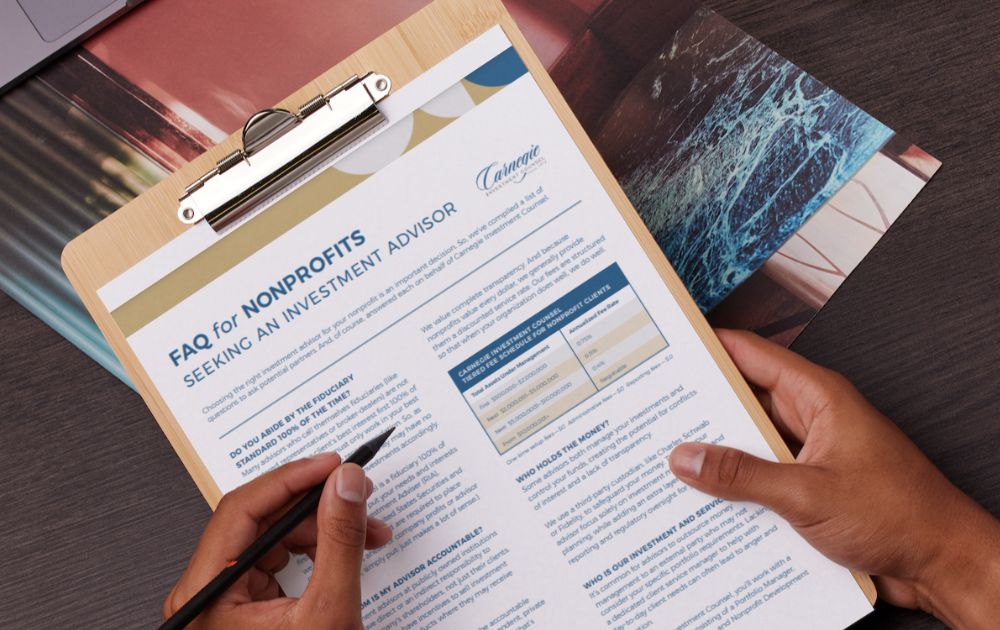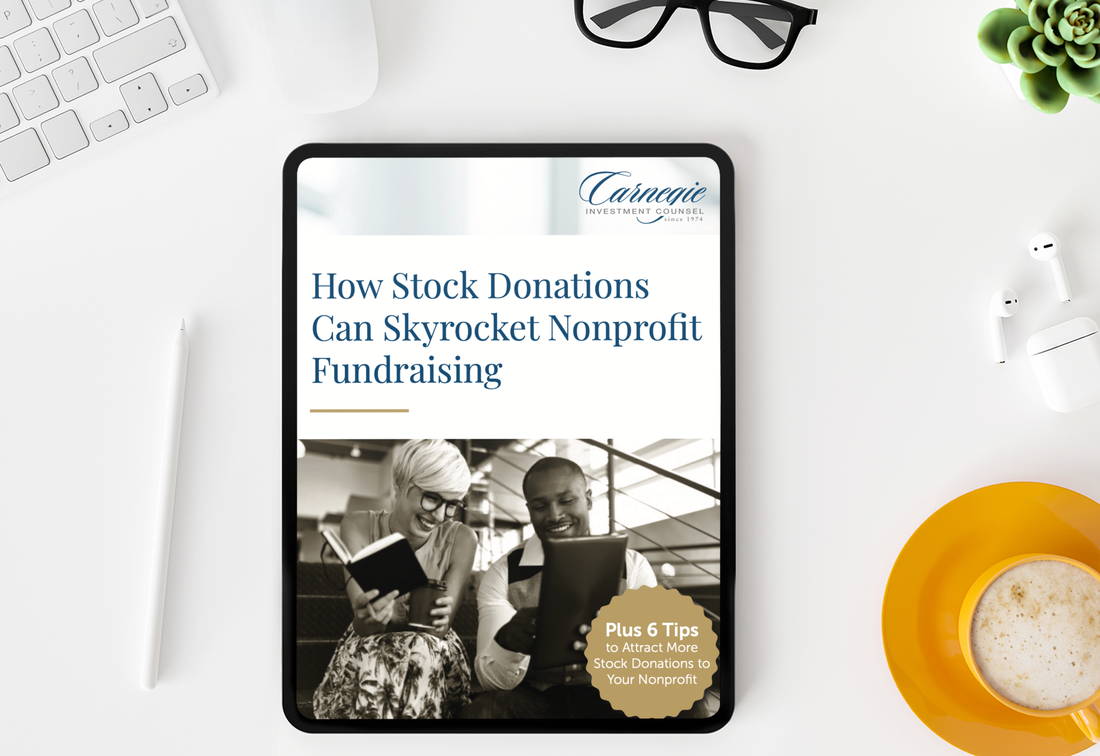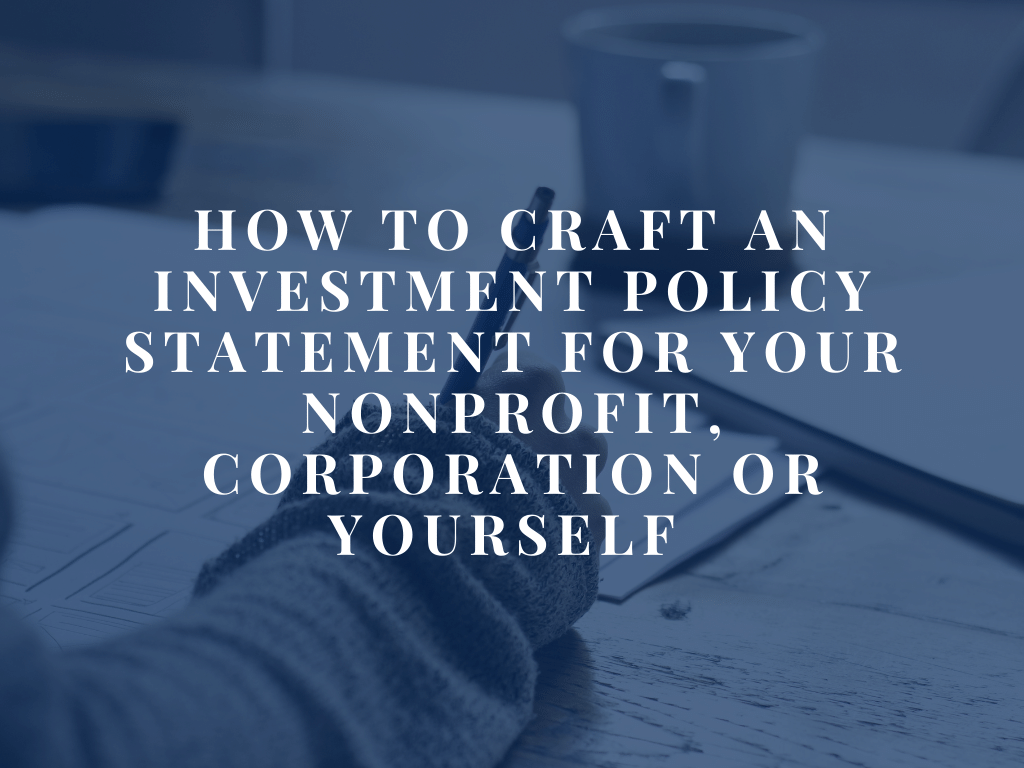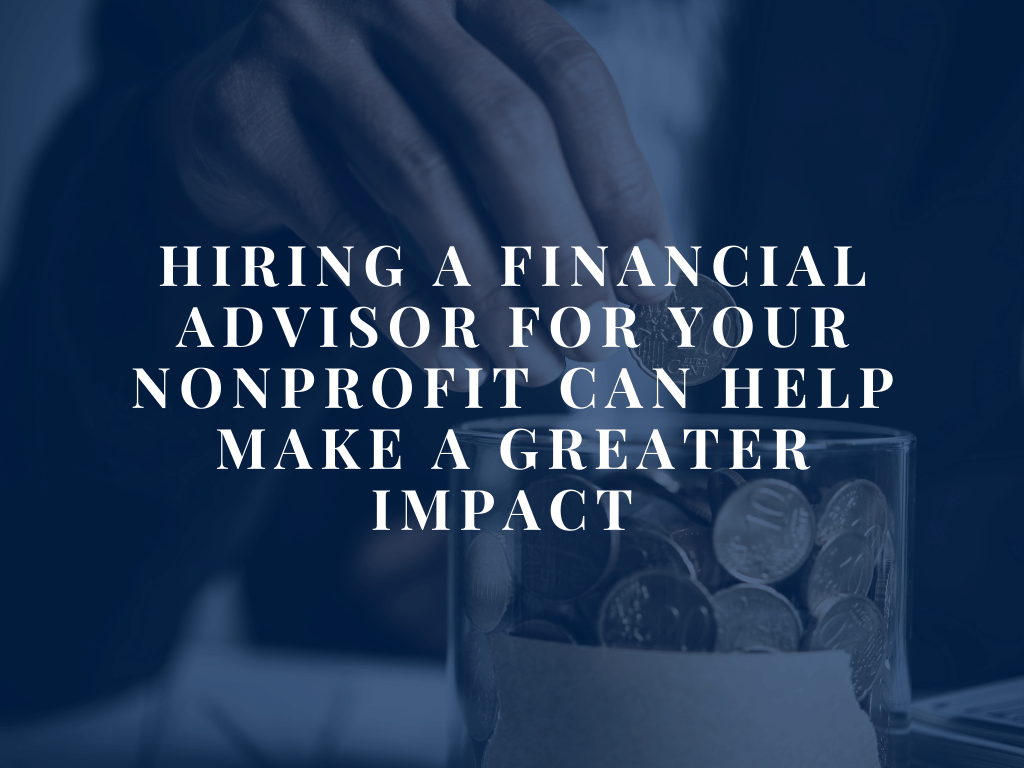We understand the challenges of nonprofit and foundation management.
A nonprofit cannot fulfill its mission if it doesn’t have adequate resources, both now and in the future. It can be a challenge to manage:
Operational costs
Capital growth expenditures
Increasing awareness among your target audience
Raising funds from donors
Capital growth expenditures
Increasing awareness among your target audience
Raising funds from donors
We understand the responsibility of stewardship as it applies to your organization’s endowment.
|
Selecting the right investment advisor for your foundation or nonprofit is a great responsibility. We believe you should partner with a fiduciary advisor you can trust to nurture assets and donor gifts.
Carnegie is an SEC Registered Investment Advisor, dedicated to serving clients by the fiduciary standard, often considered the highest standard of care. As a financial advisory firm for nonprofits and foundations, we place your organization’s best interest at the heart of our work. We are prepared to partner with you to increase the likelihood of financial success, so you can focus on making a positive impact in your community. |
Take advantage of these Carnegie benefits:
Fiduciary duty Independently owned Serving investors since 1974 Over $3.5 billion assets under management as of 12/31/2022 |
Seeking an Investment Advisor for Your Nonprofit Organization?
|
Download Our Guide: Questions All Nonprofits Should Ask When Choosing an Investment Advisor
Our team understands the unique challenges and responsibilities nonprofits face when selecting an investment advisor. We created this guide to simplify the process, helping you navigate through your search with confidence. You will learn the following...
Download Now - It's Free |
Services we provide to your nonprofit or foundation:
Portfolio management
Investment policy statement consulting
401(k) and 403(b) plan advisement
Board/investment committee education
Providing a vehicle for gifting assets
Detailed quarterly reporting
Investment policy statement consulting
401(k) and 403(b) plan advisement
Board/investment committee education
Providing a vehicle for gifting assets
Detailed quarterly reporting
We understand the responsibility of stewardship as it applies to your organization’s endowment.Carnegie has always served clients as a fiduciary, which has been called the highest standard for a financial advisor. By working with Carnegie, you may confidently follow the vision of your nonprofit, knowing you have a sound investment plan.
Using our proven research experience, we create asset allocations and customized portfolios to support your mission.At Carnegie, our firm’s stability and long-standing tenure serving foundations and nonprofit organizations allows us to build enduring relationships. We start with a thorough understanding of your organization's mission, values and resources. We then develop a financial plan to help strengthen your financial position and create strategies to weather the challenges and capture the opportunities ahead.
Our foundation and nonprofit investment process, much like our other areas, is based on transparency and an open dialogue with your specific advisor. With foundations and nonprofits, we also facilitate and simplify communications among trustees, board members and you, as portfolio manager or manager of the foundation. |
Carnegie Nonprofit Investment Strategy FAQ
Our guiding investment philosophy is to help clients meet their cash flow and portfolio growth needs while taking the least amount of risk possible to meet those objectives. We only invest client funds in publicly traded stocks or ETFs or bonds which allows us to control risk and keep costs low. We do not invest client funds in hedge funds, private equity or high-cost mutual funds. The stocks we invest in tend to be very high quality, profitable leaders in their respective industries. We prefer to use individual bonds for the fixed income portion of the portfolio so we can control quality, maturity length and cost.
Is Carnegie Investment Counsel a fiduciary?
Yes. Carnegie is a Registered Investment Adviser (RIA) with the Securities and Exchange Commission under the Investment Advisers Act of 1940. We abide by the fiduciary standard, seeking to eliminate conflicts and do what is right for every client for the lifetime of the relationship.
We believe our structure is best fitting to serve nonprofit organizations because we continuously seek to eliminate conflicts of interest. Our nonprofit clients are particularly special to us because we understand our investment services can help financially further their mission and impact the communities they serve.
Carnegie Investment Counsel is:
We believe our structure is best fitting to serve nonprofit organizations because we continuously seek to eliminate conflicts of interest. Our nonprofit clients are particularly special to us because we understand our investment services can help financially further their mission and impact the communities they serve.
Carnegie Investment Counsel is:
- 100 percent fee-only. Zero commissions, no hidden costs/fees.
- Independent and employee-owned with no affiliates or outside shareholders to serve.
- Unaffiliated with any bank or brokerage firm.
- No products to sell.
What is Carnegie’s experience serving nonprofits?
Carnegie has extensive experience serving nonprofit and foundation clients. We serve the needs of more than 45 nonprofit organizations and foundations, representing over $200 million in assets under management. Our deep understanding of their unique needs allows us to manage their assets prudently and efficiently with high transparency. We provide ongoing guidance to our foundation clients through every stage of the relationship.
How does Carnegie Investment Counsel serve nonprofits?
- We help develop or update your Investment Policy Statement (IPS). Your dedicated portfolio manager will work with the Board to develop the appropriate parameters for your investment portfolio.
- Your investment management team will actively monitor and adjust through time to ensure the portfolio is optimized for growth while seeking to protect the principal.
- Our team is available to provide board and donor education as needed.
- When your organization receives a gift of stock, we facilitate the process from beginning to end, ensuring all stakeholders have the proper receipts and documentation.
- We oversee cash flow management needs, as well.
What types of nonprofits does Carnegie Investment Counsel serve?
Among our current clients are:
- Public and government funds
- Family foundations
- Arts foundations
- Churches and religious entities
- Education and training associations
- Historical societies
- Professional groups and associations
What Is Your Client Service PHILOSOPHY?
We prioritize accountability and transparency. Carnegie personnel are devoted to putting client needs and interests first. We are dedicated to providing punctual and friendly service as client needs and requests arise. You will always have direct access to your client service team and know who is responsible for making investment decisions. We understand the essential need to trust your investment advisor; that's why we lead with transparency in our client relationships. We encourage open and honest communication so we may be efficient in meeting your service needs.
Would Our Advisor Be Able To Meet Our Board In Person?
We typically meet in person at least once or twice per year, with more frequent phone and video conference meetings throughout the year. As needs and requests arise, the board will always have direct access to its investment team. We won’t transfer you to different departments or make you talk to a robot in order to connect with your advisor. (We hate that, too.)
What are Carnegie’s asset allocation process and portfolio construction process?
The process for developing an asset allocation model has two parts, strategic and tactical. The strategic component is the long-term permissible ranges for asset classes within the fund based on its purpose and distribution needs. This is typically outlined in the Investment Policy Statement with assistance and approval from the board. Tactical allocation decisions may be made within the approved ranges based on factors such as the economic environment, asset class valuation and growth prospects over the next three to five years. We will proactively discuss this with the board if we feel it is necessary to deviate from the strategic allocations in extreme market environments.
Carnegie specializes in custom portfolio construction. We tailor portfolios through the selection of individual stocks, exchange-traded funds (ETFs) and bonds within the framework of the client's investment policy statement. Based on client objectives the portfolio manager will identify a proper mix of diversified securities across market sectors. We are committed to high-quality investment holdings, selected with a valuation-sensitive approach and delivered at a low cost to clients. Carnegie maintains a list of approved equities, referred to as the Carnegie Periodic Table of Equities™.
Security selection is accomplished through a combination of third-party research, internal analysis and collective agreement among the Investment Committee members.
Carnegie specializes in custom portfolio construction. We tailor portfolios through the selection of individual stocks, exchange-traded funds (ETFs) and bonds within the framework of the client's investment policy statement. Based on client objectives the portfolio manager will identify a proper mix of diversified securities across market sectors. We are committed to high-quality investment holdings, selected with a valuation-sensitive approach and delivered at a low cost to clients. Carnegie maintains a list of approved equities, referred to as the Carnegie Periodic Table of Equities™.
Security selection is accomplished through a combination of third-party research, internal analysis and collective agreement among the Investment Committee members.
Does Carnegie Investment Counsel use third-party custodial managers?
Yes. As an RIA, Carnegie uses third-party custodians like Charles Schwab or Fidelity to house client assets. This relationship serves as a safeguard to your account. Carnegie is then given the authority to make investment decisions on behalf of the client.
How Will You Report To Our Board, And How Frequently?
We plan to meet annually or bi-annually in person for an in-depth portfolio review where we discuss performance, security holdings, sector performance and more. We also address any necessary adjustments to the investment policy statement.
Carnegie delivers detailed quarterly reports by mail or electronically. Clients can expect to receive statements within two weeks of quarter end. Your advisor will be available to discuss these reports as needed.
Monthly custodian reports are available within two business days after the last day of the prior month. Compare Carnegie’s reporting to custodial reporting to ensure account integrity.
You will also have daily access to Carnegie’s client portal and your custodian account.
Carnegie delivers detailed quarterly reports by mail or electronically. Clients can expect to receive statements within two weeks of quarter end. Your advisor will be available to discuss these reports as needed.
Monthly custodian reports are available within two business days after the last day of the prior month. Compare Carnegie’s reporting to custodial reporting to ensure account integrity.
You will also have daily access to Carnegie’s client portal and your custodian account.
One of the foundations of our relationship will be the nonprofit’s investment policy statement.Also, we will help your organization’s governing body meet its fiduciary duties with a well-documented policy statement to provide the structure and parameters of the investment process including:
Acceptable types of investments that fit with your organization’s mission
Investment objectives and acceptable risk tolerance Process outlines for selecting acceptable allocation ranges and asset classes Cash distribution requirements to meet your organization’s needs Timeline for ongoing investment performance reviews |
Talk to an Investment Professional about Your Nonprofit
Schedule a time to learn more about how we serve nonprofits. We will learn about your organization and provide recommendations for moving forward. We look forward to speaking with you!
|
|
SCHEDULE A COMPLIMENTARY
CONSULTATION First, meet with an advisor to discuss your organization's financial objectives. |
DISCUSS YOUR GOALS
AND DEVELOP A CLEAR PLAN Second, we craft an Investment Policy Statement (IPS) (if applicable) that meets your needs and criteria. |
IMPLEMENT YOUR PLAN
WITH CONFIDENCE Third, implement an investment strategy that satisfies your cash flow, short and long-term goals. |
Nonprofit Investment Topics by Carnegie Advisors
|
The word “counsel” in our name speaks to the expertise we bring to investment management. But how does the Carnegie approach work in practice? How do we synthesize information as a team to help portfolio managers make decisions. Read More.
|
As a portfolio manager at Carnegie Investment Counsel, I am involved with creating portfolios designed to help clients meet their goals. For individuals, corporations or nonprofits, investment policy statements (IPS) are a way to outline goals and objectives. Read more.
|
Your work is important and valuable. You might even say you are “doing good in the neighborhood!” When you combine your nonprofit mission with strong financial management you can make an even greater impact for those you serve. Read more.
|










